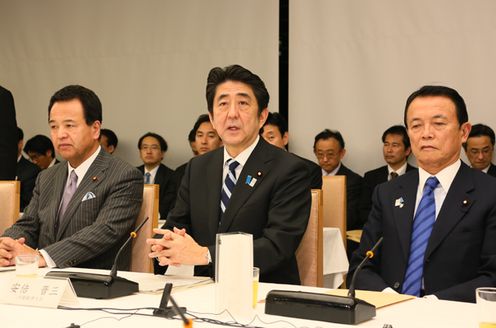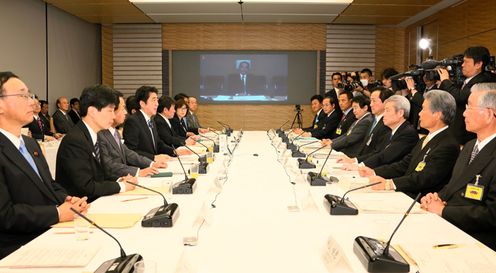Home > News > The Prime Minister in Action > March 2013 > Industrial Competitiveness Council
Industrial Competitiveness Council
Friday, March 15, 2013

Photograph of the Prime Minister delivering an address at the Industrial Competitiveness Council 1

Photograph of the Prime Minister delivering an address at the Industrial Competitiveness Council 2
Prime Minister Shinzo Abe held the fourth meeting of the Industrial Competitiveness Council at the Prime Minister's Office.
Discussion took place on the promotion of the renovation of industry, the reinforcement of human resources capabilities, and the reform of the employment system.
The Prime Minister said in his address,
"Today, I have decided to take part in the negotiations for the TPP (Trans-Pacific Partnership).
There were various opinions on this issue. We also heard opinions from you here. I have reached this decision today after carefully examining those opinions.
The TPP will further develop largely, into the RCEP (Regional Comprehensive Economic Partnership) in East Asia and the FTAAP (Free Trade Area of the Asia-Pacific), in the future. We have been required to make a decision on whether or not we are participating in making the rules, and Japan will be able to create a new economic zone together with the U.S., which is our ally.
I made a decision that Japan will serve an initiative role in making rules in this new economic zone, together with the U.S. and many other countries.
I would like to ask for your further guidance.
Promotion of the renovation of industry, the reform of the employment system, and the development of human resources, which are the items on the agenda today, are the most important issues for accelerating the transition of the industrial structure. We would like to carry forward policy changes boldly based on today's discussion.
I would like to position the period five years from now as the "period for urgent structural reform," wherein the industrial reorganization, business reconstruction, starting of new business and new investments are promoted. We will be formulating a policy package including such items as reduction of fiscal burden according to the structural reform, and the promotion of smooth transfer of labor.
Then, we will be working on a smooth transfer of labor, from a mature industry to a growing industry, without people losing jobs. Consequently, we would like to shift employment support measures largely from "focusing on employment maintenance" to "focusing on labor transfer." We will be utilizing the human resources recruitment service in the private sector at maximum, such as by disclosing the information held by Hello Work to private sectors, and entrusting the implementation of measures to support employment to private businesses.
In order to realize flexible and various working styles, we will be resolving the problem of the large gap between regular employment and irregular employment, and would like to establish a model for various types of regular employees which predetermines the workplace or job category.
From the perspective of measures against the declining birthrate and active participation by women, we would like to refer to successful examples, such as the case of Yokohama City where the expansion of nursery business is being promoted in various forms, implemented by various business operators of various sizes including companies, to consider fundamental reinforcement of measures to resolve the problem of childcare waiting lists.
Further, in order to promote the globalization of human resources, we are willing to utilize international English tests in the process of the recruitment of national civil servants, make active recruitment of faculty members of foreign nationality in universities, and develop an environment offering opportunities to study abroad to all students with willingness and capability."

